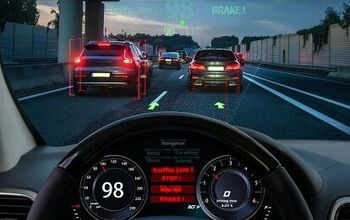Pencil-Necked Finance Dweebs Suggest Anyone Making Six-Figures Should Only Buy a $15,000 Car

Look, we’re all for a pinch or two of financial prudence around here. Springing for luxury items just isn’t in the cards for most of us, despite the lavish recompense* deigned upon us by our corporate overlords in Downtown Canada. (*note: the recompense isn’t actually lavish at all).
But even we feel comfortable calling out moronic fiscal advice when we see it. Case in point – a post on a website called Investopedia suggests that anyone making $100,000 per year should spend no more than roughly $15,000 on a car.
And, yes, the post seems to have been recently updated, with a dating of December 2023 and interest rates grounded in the current (horrible) reality we find ourselves. In order to reach this out-of-touch conclusion, the killjoys at Investopedia start with an assumption that one should limit their transportation expenses to 10 percent of an annual salary, including insurance, fuel, maintenance, and the car payment itself. Beyond that, they suggest making a down payment of at least 20 percent and financing the thing for no more than four years.
At the gross income of $100,000 annually, this shakes out to $10,000 per year or about $833 per month. Setting some variables in this equation, they propose a monthly insurance rate of $147, fuel costs of $260 per month, and maintenance pegged at $95.50 per month (about 10 cents per mile). Simple math leaves is with $330.50 for a car payment. To slide in at that figure over 48 months at 8.3 percent interest with 20 percent down, Investopedia suggests a total purchase price for your shiny new car – including taxes and whatever other fees a dealer feels like charging that day – at just $16,687.
Sixteen thousand, six hundred and eighty-seven dollars. On a car. In this economy whilst making a hundred grand. We’ll let that recommendation sink in for a second. To be fair, Investopedia does recognize the current state of the car industry elsewhere in the post, pointing out the unfortunate reality that the average transaction price of a new vehicle in America is nearly 50 grand whilst the average used set of wheels is in the $26,500 ballpark.
In fact, I feel my headline figure of $15,000 is actually generous, since the $16,687 estimate includes dealer fees and taxes. The latter generally ranges between 4 and 8 percent depending on location in this county, while anyone who’s been inside a dealership in their life knows the propensity of the business office to try and pad purchase prices with various and sundry items of questionable value. Don’t take the TruCoat.
Moseying over to AutoTrader, we find a rogue’s gallery of cars on offer for that sum. A ’17 Jag XF with 88K looks nice but is sure to cost far more than 10 cents a mile in maintenance. Same goes for the myriad of decade-old BMW X5s and Merc C-Class sedans. A fifteen-year-old Ram 1500 with 131k in near-base trim is a depressing thought to have in the driveway whilst making $100,000 per year, as is the two-wheel drive Tundra with 149k from Obama’s first term. The newest option is a Mitsubishi Mirage, of course – though you do have a choice of sedan or hatchback.
So – how about it, B&B? Am I being too snobby? Should I be resetting my sights to fiscal prudence and reality instead of thinking that anyone making six-figures shouldn’t be poked into an econobox or knackered old pickup truck? Perhaps my thinking is a root of the problem that’s caused note terms to regularly crest 84 months and debt loads to skyrocket.
Nah. Who am I kidding? If I made $100,000 per year, I sure wouldn’t be tooling around in a 2016 Equinox.
[Image: Jonathon Weiss via Shutterstock]
Become a TTAC insider. Get the latest news, features, TTAC takes, and everything else that gets to the truth about cars first by subscribing to our newsletter.

Matthew buys, sells, fixes, & races cars. As a human index of auto & auction knowledge, he is fond of making money and offering loud opinions.
More by Matthew Guy
Latest Car Reviews
Read moreLatest Product Reviews
Read moreRecent Comments
- Dartdude Having the queen of nothing as the head of Dodge is a recipe for disaster. She hasn't done anything with Chrysler for 4 years, May as well fold up Chrysler and Dodge.
- Pau65792686 I think there is a need for more sedans. Some people would rather drive a car over SUV’s or CUV’s. If Honda and Toyota can do it why not American brands. We need more affordable sedans.
- Tassos Obsolete relic is NOT a used car.It might have attracted some buyers in ITS DAY, 1985, 40 years ago, but NOT today, unless you are a damned fool.
- Stan Reither Jr. Part throttle efficiency was mentioned earlier in a postThis type of reciprocating engine opens the door to achieve(slightly) variable stroke which would provide variable mechanical compression ratio adjustments for high vacuum (light load) or boost(power) conditions IMO
- Joe65688619 Keep in mind some of these suppliers are not just supplying parts, but assembled components (easy example is transmissions). But there are far more, and the more they are electronically connected and integrated with rest of the platform the more complex to design, engineer, and manufacture. Most contract manufacturers don't make a lot of money in the design and engineering space because their customers to that. Commodity components can be sourced anywhere, but there are only a handful of contract manufacturers (usually diversified companies that build all kinds of stuff for other brands) can engineer and build the more complex components, especially with electronics. Every single new car I've purchased in the last few years has had some sort of electronic component issue: Infinti (battery drain caused by software bug and poorly grounded wires), Acura (radio hiss, pops, burps, dash and infotainment screens occasionally throw errors and the ignition must be killed to reboot them, voice nav, whether using the car's system or CarPlay can't seem to make up its mind as to which speakers to use and how loud, even using the same app on the same trip - I almost jumped in my seat once), GMC drivetrain EMF causing a whine in the speakers that even when "off" that phased with engine RPM), Nissan (didn't have issues until 120K miles, but occassionally blew fuses for interior components - likely not a manufacturing defect other than a short developed somewhere, but on a high-mileage car that was mechanically sound was too expensive to fix (a lot of trial and error and tracing connections = labor costs). What I suspect will happen is that only the largest commodity suppliers that can really leverage their supply chain will remain, and for the more complex components (think bumper assemblies or the electronics for them supporting all kinds of sensors) will likley consolidate to a handful of manufacturers who may eventually specialize in what they produce. This is part of the reason why seemingly minor crashes cost so much - an auto brand does nst have the parts on hand to replace an integrated sensor , nor the expertice as they never built them, but bought them). And their suppliers, in attempt to cut costs, build them in way that is cheap to manufacture (not necessarily poorly bulit) but difficult to replace without swapping entire assemblies or units).I've love to see an article on repair costs and how those are impacting insurance rates. You almost need gap insurance now because of how quickly cars depreciate yet remain expensive to fix (orders more to originally build, in some cases). No way I would buy a CyberTruck - don't want one, but if I did, this would stop me. And it's not just EVs.


































Comments
Join the conversation
Update: The Rules Have Changed
So it turns out that (contrary to the advice of old farts like me) you should actually listen to the Helpful Guidance handed out at Your Local Bank and Borrow Borrow Borrow for that Questionable Degree but just be sure you are Playing For The Right Team and you shall be handed $75,000.
Long live Free Enterprise.
So close to 200 comments... 😉